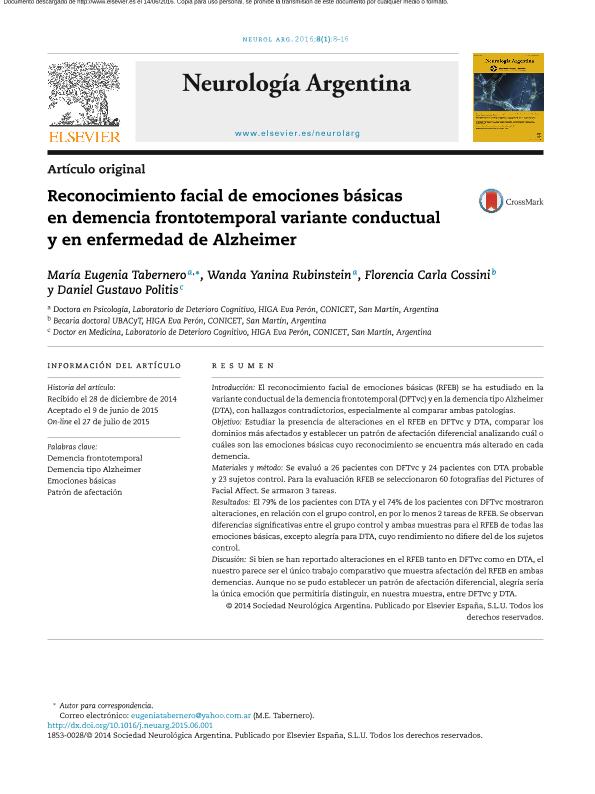Mostrar el registro sencillo del ítem
dc.contributor.author
Tabernero, María Eugenia

dc.contributor.author
Rubinstein, Wanda Yanina

dc.contributor.author
Cossini, Florencia Carla

dc.contributor.author
Politis, Daniel Gustavo

dc.date.available
2018-08-23T19:45:29Z
dc.date.issued
2016-01
dc.identifier.citation
Tabernero, María Eugenia; Rubinstein, Wanda Yanina; Cossini, Florencia Carla; Politis, Daniel Gustavo; Reconocimiento facial de emociones básicas en demencia frontotemporal variante conductual y en enfermedad de Alzheimer; Elsevier; Neurologia Argentina; 8; 1; 1-2016; 8-16
dc.identifier.issn
1853-0028
dc.identifier.uri
http://hdl.handle.net/11336/56882
dc.description.abstract
El reconocimiento facial de emociones básicas (RFEB) se ha estudiado en la variante conductual de la demencia frontotemporal (DFTvc) y en la demencia tipo Alzheimer(DTA), con hallazgos contradictorios, especialmente al comparar ambas patologías.Objetivo: Estudiar la presencia de alteraciones en el RFEB en DFTvc y DTA, comparar los dominios más afectados y establecer un patrón de afectación diferencial analizando cuál o cuáles son las emociones básicas cuyo demencia.Materiales y método: Se evaluó a 26 pacientes con DFTvc y 24 pacientes con DTA probable y 23 sujetos control. Para la evaluación RFEB se seleccionaron 60 fotografías del Pictures of Facial Affect. Se armaron 3 tareas.Resultados: El 79% de los pacientes con DTA y el 74% de los pacientes con DFTvc mostraron alteraciones, en relación con el grupo control, en por lo menos 2 tareas de RFEB. Se observan diferencias significativas entre el grupo control y ambas muestras para el RFEB de todas las emociones básicas, excepto alegría para DTA, cuyo rendimiento no difiere del de los sujetos control.Discusión: Si bien se han reportado alteraciones en el RFEB tanto en DFTvc como en DTA, el nuestro parece ser el único trabajo comparativo que muestra afectación del RFEB en ambasdemencias. Aunque no se pudo establecer un patrón de afectación diferencial, alegría sería la única emoción que permitiría distinguir, en nuestra muestra, entre DFTvc y DTA.
dc.description.abstract
Facial recognition of basic emotions (FRBE) has been studied in behavioral variant frontotemporal dementia (bvFTD) and the Alzheimer’s Disease (AD), with contradictory findings, especially when comparing both conditions. Objective: To study the presence of alterations in the FRBE in bvFTD and AD, comparing the most affected domains, and establish a pattern analyzing which one or more basic emotions is more affected in each dementia. Material and methods: 26 patients with bvFTD, 24 patients with probable AD and 23 control subjects were evaluated. For the assessment FRBE, 60 photographs were selected from the Pictures of Facial Affect. Three tasks were created. Results: 79% of patients with AD and 74% of patients with bvFTD showed alterations related to the control group, in at least two tasks FRBE. Significant differences between control and both samples for FRBE were found for all basic emotions, except for happiness in AD group, whose performance does not differ from control subjects. Discussion: Although alterations have been reported in both RFEB DFTvc and DTA, ours seems to be the only comparative study showing RFEB impairment in both dementias. Despite the fact that a differential pattern could not establish, happiness would be the only basic emotion that would distinguish, in our sample, among bvFTD and AD.
dc.format
application/pdf
dc.language.iso
spa
dc.publisher
Elsevier

dc.rights
info:eu-repo/semantics/openAccess
dc.rights.uri
https://creativecommons.org/licenses/by-nc-sa/2.5/ar/
dc.subject
Affectation Pattern
dc.subject
Alzheimer'S Disease
dc.subject
Basic Emotions
dc.subject
Frontotemporal Dementia
dc.subject.classification
Psicología

dc.subject.classification
Psicología

dc.subject.classification
CIENCIAS SOCIALES

dc.subject.classification
Medicina Critica y de Emergencia

dc.subject.classification
Medicina Clínica

dc.subject.classification
CIENCIAS MÉDICAS Y DE LA SALUD

dc.title
Reconocimiento facial de emociones básicas en demencia frontotemporal variante conductual y en enfermedad de Alzheimer
dc.title
Facial recognition of basic emotions in behavioral variant Frontotemporal Dementia and in Alzheimer's disease
dc.type
info:eu-repo/semantics/article
dc.type
info:ar-repo/semantics/artículo
dc.type
info:eu-repo/semantics/publishedVersion
dc.date.updated
2018-08-08T14:02:17Z
dc.journal.volume
8
dc.journal.number
1
dc.journal.pagination
8-16
dc.journal.pais
Argentina

dc.description.fil
Fil: Tabernero, María Eugenia. Consejo Nacional de Investigaciones Científicas y Técnicas; Argentina
dc.description.fil
Fil: Rubinstein, Wanda Yanina. Consejo Nacional de Investigaciones Científicas y Técnicas; Argentina
dc.description.fil
Fil: Cossini, Florencia Carla. Consejo Nacional de Investigaciones Científicas y Técnicas; Argentina. Universidad de Buenos Aires; Argentina
dc.description.fil
Fil: Politis, Daniel Gustavo. Consejo Nacional de Investigaciones Científicas y Técnicas; Argentina. Laboratorio de deterioro congnitivo; Argentina. HIGA, Eva Peròn; Argentina
dc.journal.title
Neurologia Argentina
dc.relation.alternativeid
info:eu-repo/semantics/altIdentifier/doi/https://doi.org/10.1016/j.neuarg.2015.06.001
dc.relation.alternativeid
info:eu-repo/semantics/altIdentifier/url/https://www.sciencedirect.com/science/article/pii/S1853002815000646
Archivos asociados
